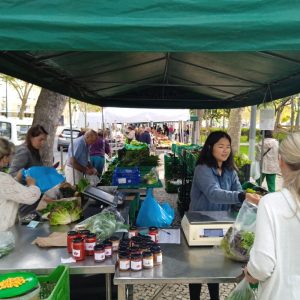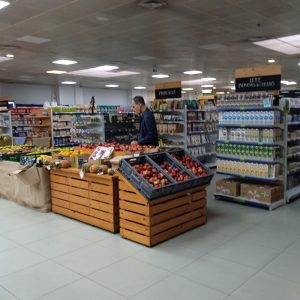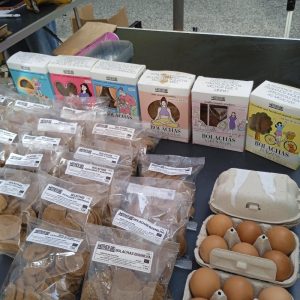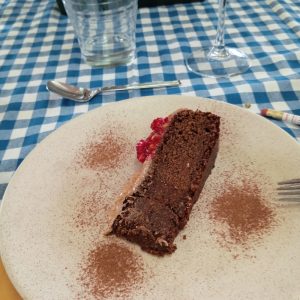Saturday 2nd November 2024.

On Saturday 19 October, ECO123 was invited to take part in an event for journalists, organised by Agrobio (1), under the scope of a European programme, with its main aim being to provide a lunch made from organic foodstuffs for us to sample and appreciate. In addition, we visited a street market selling organic products and an organic supermarket. This is an increasingly important subject in Portugal, considering that, at this moment in time, 27.7% of farmland in Portugal is already given over to organic production. 70% of this land is used for grazing, and therefore linked to livestock farming; after this, in order of magnitude, the rest of the land consists of olive groves, vineyards, vegetable crops and fruit orchards.
The morning began with a visit to the Agrobio street market in the company of Jaime Ferreira, the president of Agrobio and two of his collaborators. This market is held every Saturday in the square of the Campo Pequeno bullring in Lisbon. The producers attending this market come from the capital’s suburban region, most notably from the areas around Sobral de Monte Agraço, Alcochete and Caldas da Rainha. The produce that they sell is usually seasonal in nature, consisting essentially of fruit and vegetables, but some producers choose to complement their products with other homemade goods, such as biscuits, bread and cheese. The aim is to present stalls selling a range of different products, so that the producers operate a resale system among themselves in order to improve what they each offer to their customers. When I spoke to some of the producers, their dedication and passion for this business was clear to see, in the sense that not only does it provide them with a livelihood, but it is also something that they engage in with a sense of mission. As far as the consumers are concerned, they are people of all ages from a variety of origins, but they tend to come to the market in separate waves: normally, the older people appear early on, followed by the families, and then, finally, the younger customers
After this, we went to Rua Latino Coelho, also in Lisbon, to visit the organic food market of Miosótis (2). This market, which corresponds, in appearance, to a reasonable-sized supermarket, has all kinds of products, especially food, but also other articles that a family might need. In particular, there is a wide variety of ready-made foodstuffs, which have become much more popular since the COVID outbreak.
Miosótis also has a simple and spacious restaurant, where we had lunch. The meal, which was made from entirely organic produce, was a surprise for my tastebuds. We began with bread and olives, followed by a highly nutritional vegetable soup and then the main dish, composed of a salad of cereals with a variety of vegetables and a whole series of side dishes designed to complement the dish with varied and pleasant tastes.
I then experienced a rather surprising moment for an egg eater: the young chef in charge of the organic chicken, which was the supplementary dish (and. in fact. a very tasty one), presented us with fried eggs with a decidedly orange colour, purchased on the customary market, and then an egg with a yellowish yolk produced by breeds of hens in danger of extinction and raised organically, which tasted like a genuine egg. Since eating this egg, I have become incapable of eating eggs unless they are organic ones, at least for the foreseeable future.
Our meal ended with a dessert made from cocoa and dates, with the added particularity of its not containing any sugar at all, although we did not notice its absence.
If the idea was to convince us not only of the health aspect, but also of the taste of organic food and even to appeal to us from an aesthetic point of view, then this aim was most certainly achieved.
(1) Agrobio-Associação Portuguesa de Agricultura Biológica (Portuguese Association of Organic Farming), a private body founded in 1985, with its headquarters in Lisbon. This Association obtains roughly 50% of its income from the services it provides to producers, with the other 50% originating from European projects.
(2) Miosótis – A shop selling organic products, comprising a supermarket, restaurant and cafeteria. It also has a small auditorium for the holding of events.
 Eco123 Revista da Economia e Ecologia
Eco123 Revista da Economia e Ecologia






